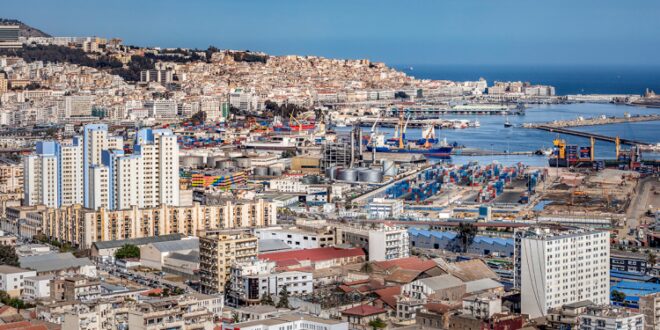Until recently, it seemed as though Algeria’s generals were running out of options. After the 2014 oil price crash, the country experienced years of budgetary constraints and a collapsing currency, followed by the rise of a national protest movement, known as the Hirak, in 2019 that led to the removal of President Abdelaziz Bouteflika by the army in April of that year.
After installing a new president, Abdelmadjid Tebboune, the regime took advantage of the COVID-19 pandemic to increase its repression of protesters and opposition voices. But the prospect of a return to large-scale protests, fueled by a sharp decline in living standards, remained an ongoing threat.
Today, that possibility seems less likely. This is not because life has become easier for average Algerians. The value of the Algerian dinar against the dollar has been falling continuously since 2014. Drought and lack of investment in infrastructure have repeatedly led to the rationing of tap water in major cities, especially in the summer of 2021. Unemployment has risen with the economic crisis fueled by the pandemic. Dependence on imported food has continued to erode Algerians’ purchasing power in a context of rising global inflation.
Still, amid all the difficulties, Algeria’s power structure — made up of an assortment of military personnel, secret services operatives, and aging politicians — is now benefiting from the most favorable conditions in years for ensuring its hold on power. As Russia’s war on Ukraine keeps oil and gas prices high, Algeria’s autocratic regime is replenishing its financial reserves after years of depleting them. This renewed budgetary space will make it easier for the government to deal with any hint of popular discontent.
But rather than going back to splurging on new salary increases or other forms of accelerated rent distribution as it has done in the past, the regime seems to be adopting a more cautious approach this time around. It appears to be modulating its financial response based on the needs of the moment while keeping a watchful eye out for any waves of social and economic strife. Although it has greater resources at its disposal now, the regime is only likely to loosen its purse strings if prices continue to rise sharply, sparking renewed unrest. In the meantime, it will likely look at the current situation as an opportunity to increase the state’s financial reserves and strengthen its position to deal with any future crises.
Rentier dependency
Algeria relies heavily on hydrocarbons exports. Over the 2015-20 period they accounted for 19% of GDP, 94% of product exports, and 40% of budget revenues, according to figures from the World Bank. After the collapse of oil prices in 2014, Algeria ran fiscal and current account deficits for years. To support itself, it burned through the financial reserves it had accumulated during the oil super-cycle of 2008-14. After years of simmering popular discontent, it was the decline in energy revenues that paved the way for the emergence of the Hirak protest movement in 2019. From $121.9 billion in October 2016, Algeria’s foreign exchange reserves had fallen to $42 billion by March 2021. With no clear planning or strategy, the country faced an unavoidable need for a financial bailout — either from multilateral institutions, or a bilateral agreement with a friendly nation. With their backs seemingly against the wall, Algeria’s rulers appeared to be out of options save waiting for a miracle.
But in late 2021, Algeria’s hydrocarbons revenues, and with them the country’s economic fortunes, begun to improve. Post-COVID economic acceleration and logistics constraints led to a surge in oil prices over the fourth quarter of 2021. After starting the year at roughly $50 per barrel, Brent crude prices averaged $71 throughout 2021 and reached as high as $86.
Encouraged by higher global demand and prices, Algeria increased production from 175.9 million tons of oil equivalent (toe) in 2020 to 185.2 million toe in 2021. Over the same period, hydrocarbon export revenues rose from $20 billion to $34.5 billion. At last, Algeria’s ruling system was getting what it had wished for: some breathing room.
Saved by the war
Even before the start of the conflict in Ukraine, the Algerian authorities seemed to be concerned that rising global inflation, especially in food commodity prices, could unleash a new wave of protests across the country. In mid-February, President Tebboune made a surprise announcement: Tax increases on certain food products that had been included in the 2022 budget would be frozen.
Then, Vladimir Putin’s decision in late February to invade Ukraine pushed oil prices further upwards. Even with Brent crude prices momentarily exceeding $123 per barrel at the start of the war, the Algerian authorities initially appeared cautious about increasing public expenditure on the back of rising export revenues. The government seemed to be keeping to the 2022 budgetary projections made before the start of the conflict.
More recently, however, the government has allocated DA35 billion ($240 million) to stabilize the prices of sugar and cooking oil, two staples that have seen huge price increases. Furthermore, DA80bn ($550 million) has been channeled to fund unemployment support. Beneficiaries receive DA13,000 ($89) per month. As of mid-April, over 900,000 Algerians aged 18-40 had been accepted into the program. Financing this type of support would be much harder if oil prices were still in the $70 range, as opposed to the $113 Brent was trading at in late May.
This is not the first time the regime has used financial transfers to maintain social peace. In 2011, amid the regional Arab Spring protests, the authorities approved retroactive salary increases for police officers and raised subsidies on cereals, cooking oil, sugar, and milk. Later that year, following workers’ strikes, the government increased pensions from 20% to 30%. This time around, only a significant worsening of public unrest will likely see the government channel increased financial support to specific constituencies, rather than maintain its path of attempting to reduce the overall pressure of inflation on Algerian households through subsidies.
A diplomatic upgrade
Besides injecting much-needed liquidity into Algeria’s coffers, the war in Ukraine has also raised the country’s diplomatic standing. The aging generals’ opaque way of dealing with foreign powers and their inability to implement economic and political reforms cemented Algeria’s reputation as a sort of mild pariah state, despite its importance as an energy producer and its strategic relevance in dealing with instability in the Sahel. This decline in status has accelerated in recent years, as Algeria’s dispute with neighboring Morocco over the Western Sahara became increasingly volatile.
But now, Algeria finds itself in an enviable position as an energy exporter. After Spain aligned itself with Morocco on the Western Sahara issue, Algiers refused to increase gas sales to Madrid, and even threatened to cut off gas exports altogether if Spain resold any Algerian gas to Morocco.
U.S. officials have been trying to mend strained ties with countries such as Venezuela, Iran, Saudi Arabia, and the United Arab Emirates to bring more oil and gas volumes into world markets. Compared to these countries, Algeria’s role as an energy supplier of recourse is much more limited. But the fact that most Western economies are aiming to reduce their reliance on Moscow’s energy is another bit of good news for Algeria’s rulers and their quest to maintain the status quo.
The country produces roughly 1 million barrels per day (bpd) of oil, and a recent OPEC+ meeting that agreed on new quotas for the production cartel has established that Algeria’s daily output will be raised by 11,000 bpd by June. The higher output will take oil production from 1,013,000 bpd in May to roughly 1,024,000 bpd in June. At current price levels, this is a significant incremental increase in Algeria’s daily revenues.
Gas needs
But it is Algeria’s natural gas production that is of particular interest for Western countries at present. Algeria produces around 130 billion cubic meters of gas per year, and is ranked as the 10th largest global gas producer and one of the top five liquefied natural gas (LNG) exporters to Europe. At present, Europe sources 11% of its natural gas needs from Algeria, but the country’s energy sector can’t significantly increase production in the short term or boost its share of the European gas market.
Domestic gas consumption has increased significantly over the years, driven by growing residential use and the gas-powered plants that produce all of Algeria’s electricity. The country now consumes roughly 60% of its gas output.
Furthermore, Algeria’s aging hydrocarbons fields require vast sums of private and public investment to reverse years of sustained underinvestment. Bringing new discoveries online will require foreign partners willing to deal with Algeria’s opaque regulatory regime and difficult-to-navigate business environment.
But with European countries looking to stockpile energy resources before the coming winter, any additional supplies will help. Algeria has already signed a deal to increase gas sales to Italy over the medium term. With two natural gas pipelines connecting it to Spain and Italy, the country will remain a small but important alternative source of gas to the EU.
Even if in the short term the country will not be able to supply more than a few additional billion cubic meters of gas per year, the current crisis increases Algeria’s strategic value to Europe. This will potentially make both Brussels and Washington think twice before being excessively critical about the military regime’s ongoing repression of civil and political liberties.
Further testing Algeria’s neutrality regarding the conflict in Ukraine, Russian Foreign Minister Sergey Lavrov made a surprise visit to Algiers on May 10. He extended an invitation from Russian President Vladimir Putin for President Tebboune to visit Moscow. Russia has been a historical partner for Algeria and a key weapons supplier. Between 2016 and 2020 Moscow sold Algiers $4.2 billion in arms, equivalent to nearly 15% of Russia’s total weapons exports for that period. Lavrov’s visit came less than two months after U.S. Secretary of State Antony Blinken’s trip to the Algerian capital. As long as the conflict lasts, Algeria will likely be able to play nice with both sides and find willing buyers for any hydrocarbons it can spare.
Repression rebooted
Despite the government’s greater ability to throw money at social problems, most of the underlying conditions that gave rise to the 2019 Hirak protests haven’t changed significantly. A majority of Algerians face growing pressure from high prices, reduced civil and political rights, and a lack of economic opportunities.
Since February 2021, when the Hirak protests resumed, thousands of Algerians have been arrested or temporarily detained for participating in demonstrations or sharing dissenting opinions online. At the start of 2022, Algerian jails were still hosting hundreds of political prisoners. In April, for the month of Ramadan, the Algerian presidency announced an amnesty for 70 of them. According to President Tebboune, who has repeatedly denied there are any political prisoners in Algeria, they had been accused of “public disorder.”
The gesture did not signal a change in strategy for the regime. The country’s opaque leadership will continue to curb civil liberties and use energy resources as a way to maintain the politico-military oligarchy that has ruled since independence. Flush with oil and gas money, it can more easily raise the salaries of security personnel sent to break up protests, or reduce the price of bread and other commodities to prevent people from going out on the streets in the first place. As long as the conflict in Ukraine keeps oil and gas prices high, Algeria’s autocratic regime will continue to wield most of the instruments it needs to ensure its survival.
 Eurasia Press & News
Eurasia Press & News



